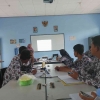A provocative new dataset titled "Designing Navajagat OS: A Centralized Quantum Operating System for the Aluxhim Model" has just been released on Harvard's Dataverse platform (DOI:10.7910/DVN/N4BNXB), inviting scholars, technologists, critics, and thinkers from all disciplines to respond, collaborate; or dissent.
The Aluxhim Model is a post-capitalist, metaphysically infused infrastructure that serves as the foundation for the dataset's ambitious speculative concept for a centralized quantum operating system. The operating system, called Navajagat OS, combines theoretical ideas from esoteric metaphysics, dialectical materialism, AI system design, and particle physics to pose challenging and occasionally frightening concerns regarding the future of consciousness, knowledge production, and governance.
The Research Landscape
The article builds on a growing body of fringe yet highly structured speculative research by the same author, including:
Hypothetical Possibility of Scotons: Dark Particles at the Intersection of Metaphysics and Physics (DOI:10.5281/zenodo.15794298)
Metatron Particle: Hypothetical Mediator of Scoton Transmutation and Dark Matter Highways Travel Implication (DOI:10.5281/zenodo.15800984)
Hypothetical Sandalphon Particle: A Theoretical Model for Cellular Scotonic Transduction via a Bioelectromagnetic Mediator (DOI:10.7910/DVN/TG3HAB)
The Aluxhim Model: A Post-Capitalist Framework for Permanent Socialist Transition and Future Communist Adaptations (DOI:10.5281/zenodo.15814257)
These connected pieces depict a quantum-astrophysical architecture intended for space-time manipulation, biological interfaces, societal reformation, and computation.
A Call for Radical Peer Engagement
Designing Navajagat OS's creator welcomes criticism, improvement, rebuttals, and philosophical inquiry. The information is publicly available, and the paper serves as a challenge for both cooperative and competitive research rather than asserting definitiveness.
"We do not need a consensus," the researcher notes in a personal text "we need rigorous opposition and wild collaboration."
This is a genuine call for post-disciplinary participation, a turning point in modern research culture. The work is ripe for criticism and clarification, regardless of your discipline; computer science, philosophy, political economy, theology, or speculative design.







